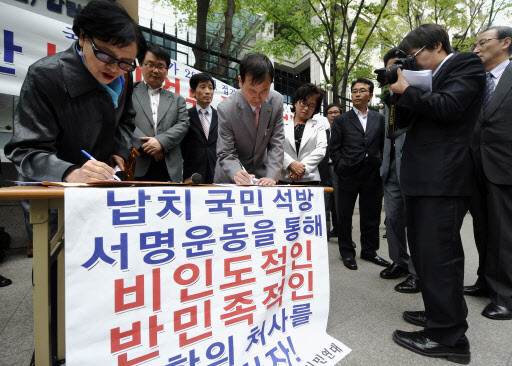hankyoreh
Links to other country sites 다른 나라 사이트 링크
S. Korean held for 30 days in incommunicado detention by North Korea

As of Tuesday, April 28, North Korean authorities will have detained a South Korean citizen for thirty days. Criticism of North Korea is mounting as it continues to deny South Korean authorities access.
The “Citizens Solidarity for the Campaign to Release the South Korean National Abducted and Detained in the Kaesong Industrial Park,” an ad hoc umbrella organization of conservative groups promoting human rights in North Korea and groups promoting inter-Korean relations like the North Korea Forum and the Citizen‘s Solidarity for Inter-Korean Economic Cooperation held a demonstration near the Unification Ministry in downtown Seoul April 27. The groups denounced “inhumane and anti national behavior on the part of North Korea,” which the groups say, “is spreading negative views towards North Korea.”
North Korea informed South Korean authorities that the South Korean citizen and employee of Hyundai Asan is being detained for criticizing North Korea’s government and trying to persuade a local woman worker to defect. North Korea has provided no other information since about how the individual criticized North Korea, who he encouraged to defect, and other specific case details.
When the investigation will be concluded remains unknown. North Korean criminal law permits up to ten days for initial investigations, and between two and four months for full-fledged investigations, after which the accused may be indicted. The South Korean citizen being detained by North Korean authorities could therefore be held until early August. Unilaterally applying its own judicial system would be a violation of an agreement on South Korean workers entering and staying in North Korea. Many South Korean observers still think North Korea will not proceed by putting the employee through a North Korean trial process, as it has so far acted in accordance with the agreement by informing South Korea of his detainment.
Some observers speculate whether North Korea continues to investigate the South Korean employee because he is not telling authorities what they want to hear or because North Korea wants to maximize the effect of the case.
An expert said there is a possible linkage between the detention and the remarks made during the brief meeting between officials of the two countries in Kaesong on April 21, when North Korean officials accused South Korea of “trying to use the Kaesong Industrial Park as a base from which to oppose us.” An executive with one South Korean company with operations in Kaesong says he believes Pyongyang thinks the Seoul government had something to do with the actions of the individual detained and is trying to use the case to push back.
Criticism has emerged regarding the Seoul government‘s inability to come up with a plan to resolve the situation. On April 21, South Korean Foreign Minister Yu Myung-hwan said Seoul is considering taking the case to the United Nations (UN) Human Rights Council. A decision by the body could come in a year from now, at the earliest, and some criticize this idea by saying North Korea could have something like an allergic reaction to a resolution and thereby have the reverse effect. A critic say turning this situation into an international human rights case would just have a rhetorical effect and is not a substantial solution.
One South Korean government official said Seoul would give priority to the case in follow-up meetings with North Korea, but that it “remains unknown whether North Korea is going to be willing to talk about it.” It has been learned that Seoul will simultaneously attempt to maintain talks with North Korea, while seeking separate channels to discuss the issue of the detained South Korean citizen.
Please direct questions or comments to [englishhani@hani.co.kr]
Editorial・opinion
![[Column] Is Korean democracy really regressing? [Column] Is Korean democracy really regressing?](https://flexible.img.hani.co.kr/flexible/normal/500/300/imgdb/original/2024/0705/2917201664129137.jpg) [Column] Is Korean democracy really regressing?
[Column] Is Korean democracy really regressing?![[Column] How tragedy pervades weak links in Korean labor [Column] How tragedy pervades weak links in Korean labor](https://flexible.img.hani.co.kr/flexible/normal/500/300/imgdb/original/2024/0703/8717199957128458.jpg) [Column] How tragedy pervades weak links in Korean labor
[Column] How tragedy pervades weak links in Korean labor- [Column] How opposing war became a far-right policy
- [Editorial] Korea needs to adjust diplomatic course in preparation for a Trump comeback
- [Editorial] Silence won’t save Yoon
- [Column] The miscalculations that started the Korean War mustn’t be repeated
- [Correspondent’s column] China-Europe relations tested once more by EV war
- [Correspondent’s column] Who really created the new ‘axis of evil’?
- [Editorial] Exploiting foreign domestic workers won’t solve Korea’s birth rate problem
- [Column] Kim and Putin’s new world order
Most viewed articles
- 110 days of torture: Korean mental patient’s restraints only removed after death
- 2Months after outcry over “torture devices,” Justice Ministry proposes more restraints for immigratio
- 3[Column] Is Korean democracy really regressing?
- 4Former bodyguard’s dark tale of marriage to Samsung royalty
- 5Beleaguered economy could stymie Japan’s efforts to buoy the yen
- 6Real-life heroes of “A Taxi Driver” pass away without having reunited
- 7[Editorial] Exploiting foreign domestic workers won’t solve Korea’s birth rate problem
- 8[Column] How tragedy pervades weak links in Korean labor
- 9Koreans are getting taller, but half of Korean men are now considered obese
- 10Democrats ride wave of 1M signature petition for Yoon to be impeached